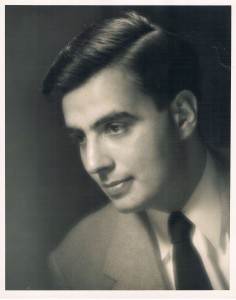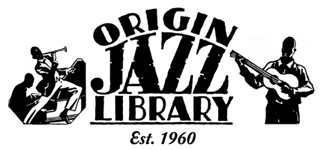 Origin Jazz Library was founded in 1960 by Bill Givens (photo at right) and Pete Whelan, two friends who had gone to boarding school together at Soleburh School in New Hope, Pennsylvania. Their idea was to reissue classic blues recordings of the 1920s and 1930s, which at that time were generally not considered to be of interest, even to those whose primary interest was roots music of that period. The first issue was “The Immortal Charlie Patton,” which was received with considerable interest by the emerging “folk revival” community.
Origin Jazz Library was founded in 1960 by Bill Givens (photo at right) and Pete Whelan, two friends who had gone to boarding school together at Soleburh School in New Hope, Pennsylvania. Their idea was to reissue classic blues recordings of the 1920s and 1930s, which at that time were generally not considered to be of interest, even to those whose primary interest was roots music of that period. The first issue was “The Immortal Charlie Patton,” which was received with considerable interest by the emerging “folk revival” community.
The label soon established itself as the vanguard of a host of independent labels which helped bring about the traditional blues revival of the 1960s, and added immensely to the body of influences which helped shape rock music. In 1967, Whelan turned over his share of the company to Bill Givens, who continued to put out new releases through the late 1960s, and well into the 1970s, by which time many other labels, such as Yazoo, had reissued the bulk of the worthwhile pre-WWII blues material, so the flow of new OJL issues slowed to a trickle. By the mid-90s, despite most of the tracks Bill issued being available on CD, Bill continued to receive orders for his LPs, due in large part to OJL’s pioneering reputation.
Tragically, Bill died suddenly of a massive heart attack, early in the morning of January 23, 1999, the day after his most recent project, “Bix Restored, Volume 2″ was picked up from the pressing plant. Shortly afterwards, Cary Ginell and Michael Kieffer, both of whom had worked for Bill on later OJL releases, elected to keep the company going.
Cary Ginell
Cary Ginell is a veteran radio broadcaster, folklorist, and author of eight books on American roots music. Cary has annotated dozens of albums for labels such as Naxos, Living Era, Texas Rose, Rambler, Bear Family, Rhino, Revenant, and Origin Jazz Library. He has been honored five times by the ARSC (Association for Recorded Sound Collections) with awards for “Excellence in Historical Recorded Sound Research” for his books, “Milton Brown & the Founding of Western Swing” (University of Illinois Press, 1994), “Discography of Western Swing & Hot String Bands” (Greenwood Press, 2001), “Good Vibes” (Scarecrow Press, 2003) (an autobiography of jazz musician Terry Gibbs), “Old Shep: The Recordings of Red Foley” (Bear Family Records), and “Hot Jazz for Sale: Hollywood’s Jazz Man Record Shop” (Lulu.com). The Gibbs biography also won the prestigious ASCAP/Deems Taylor Award for music journalism in December 2004. Cary was also the associate producer and annotator for the Grammy-nominated anthology “Washington Square Memoirs: The Great Urban Folk Boom – 1950-1970″ (Rhino Records, 2001). A longtime supporter of public radio, Cary produced specials for NPR’s “Jazz Profiles” on Terry Gibbs and flutist Herbie Mann. His latest books are biographies of Cannonball Adderley, Billy Eckstine, and Herbie Mann, for Hal Leonard Books’ “Jazz Biography” series. Cary holds a master’s degree in Folklore from UCLA. He is also the director and flutist for the Sedalia Ragtime Orchestra, with two releases on OJL.
Michael Kieffer
Michael Kieffer has a BS in electrical engineering and works as a software engineer by day, performing his OJL remastering and production duties in his spare time. He is primarily self-taught in the art of audio restoration, but has also received guidance from John R.T. Davies, Seth Winner and Steven Lasker. In addition to working for OJL, he has remastered CDs for Original Music and Good Music Record Company, and has provided recordings from his extensive music archive (which now numbers over 20,000 records of all speeds and types) for dozens of reissue projects, including CDs released by Sony Music, BMG, MCA/GRP, Rhino, Arhoolie and Yazoo. He began amassing his music archive nearly 30 years ago, and worked for many years with radio personality Dr Demento, whose extensive archive and broad knowledge of music was a profound influence on him. His archive’s strengths are in the genres of 1920s-30s jazz, blues, Hawaiian and western swing, pre-1920 vaudeville and ragtime, Calypso, various Caribbean and Latin styles from the 1900s-1950s, and sub-Saharan African pop from the 1950s-60s.



